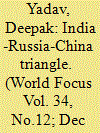| Srl | Item |
| 1 |
ID:
183649


|
|
|
|
|
| Summary/Abstract |
North Korea has made significant strides in its attempt to acquire a strategic nuclear deterrent. In 2017, it tested intercontinental ballistic missiles (ICBMs) and completed a series of nuclear test explosions. These may provide North Korea with the technical foundation to deploy a nuclear-armed ICBM capable of striking the United States. The Ground-based Midcourse Defense (GMD) missile defense system is intended to deter North Korean nuclear coercion and, if deterrence fails, to defeat a limited North Korean attack. Despite two decades of dedicated and costly efforts, however, the GMD system remains unproven and unreliable. It has not demonstrated an ability to defeat the relatively simple and inexpensive countermeasures that North Korea can field. The GMD system has suffered persistent delays, substantial cost increases, and repeated program failures because of the politically motivated rush to deploy in the 1990s. But GMD and other U.S. missile defense efforts have provoked serious concerns in Russia and China, who fear it may threaten their nuclear deterrents. Diplomacy and deterrence may reassure Russia and China while constraining North Korea's nuclear program. An alternate airborne boost-phase intercept system may offer meaningful defense against North Korean missiles without threatening the Russian or Chinese deterrents.
|
|
|
|
|
|
|
|
|
|
|
|
|
|
|
|
| 2 |
ID:
125325


|
|
|
| 3 |
ID:
118302


|
|
|
|
|
| Publication |
2012.
|
| Summary/Abstract |
Despite the initially cordial relationship between the United States and Russia following the September 11, 2001 attacks, the Iraq War became a turning point in what evolved into the worst relationship between Moscow and Washington since the Cold War. From that point onwards, Russia persistently has exhibited aggressive behavior toward the United States, resulting in numerous crises. This article argues that this Russian assertiveness is deliberate, arising from a mixture of domestic and international factors. In light of recent developments in U.S.-Russian relations, especially the decision of American President Barack Obama to abandon the Bush Administration's scheme to deploy national missile defense (NMD) system in Eastern Europe, it is important to understand that Russia's grand strategy is aimed at promoting multipolarity and that Moscow is willing to apply limited military force to achieve its goals. The Obama Administration should engage Russia, but be prepared to confront it if necessary.
|
|
|
|
|
|
|
|
|
|
|
|
|
|
|
|